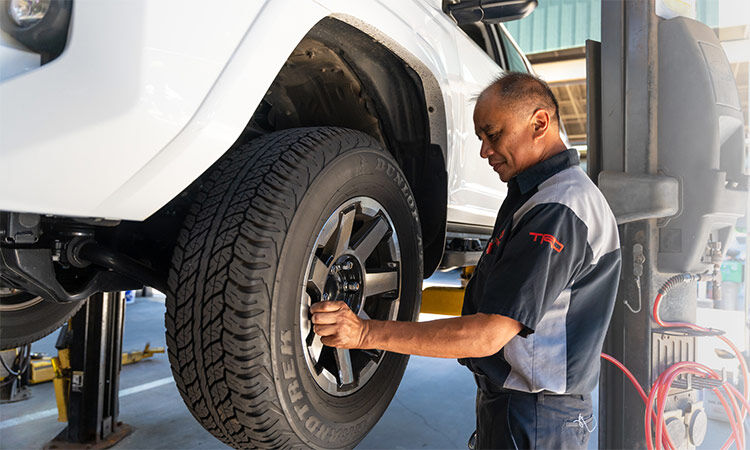Morris Tire: Your Trusted Regional Tire Professionals
Morris Tire: Your Trusted Regional Tire Professionals
Blog Article
The Link Between Tire Solution and Fuel Efficiency
Among the different variables that influence fuel efficiency, tire solution stands out as a crucial component that typically goes overlooked. The detailed connection between tire upkeep and gas economic climate is a testimony to the detailed functions of a vehicle.
Relevance of Proper Tire Rising Cost Of Living
Appropriate tire inflation is a vital consider optimizing gas efficiency and making sure optimum vehicle efficiency. When tires are underinflated, it develops more moving resistance, causing the engine to work more difficult and shed even more gas to keep the same speed. On the various other hand, overinflated tires can lead to a harsher trip, unequal tire wear, and minimized grip. To locate the advised tire stress for your lorry, refer to the owner's handbook or the sticker located on the motorist's side door jamb.
Preserving the correct tire stress not just enhances fuel performance however also improves driving safety. Routinely examining and readjusting tire stress, specifically before lengthy trips, is a straightforward yet efficient means to maximize your car's gas economic climate and ensure a smooth driving experience.
Influence of Tire Tread Depth
Keeping the advised tire stress is necessary for optimum automobile efficiency and fuel efficiency; in a similar way, the step deepness of your tires plays a crucial function in making certain safety and security and grip on the road. Tire step deepness straight affects the ability of your tires to grip the roadway surface area, particularly in wet or slippery problems. Regularly inspecting your tire step deepness and replacing tires when necessary is a simple yet reliable way to advertise both safety and security and fuel efficiency on the roadway.
Function of Wheel Alignment in Performance
Guaranteeing accurate wheel positioning is vital for maximizing car performance and optimizing fuel economic situation. Appropriate wheel positioning includes adjusting the angles of the wheels to maker specifications, making sure that they are parallel to each various other and vertical to the ground. When wheels are misaligned, it can lead to irregular tire wear, increased moving resistance, and lowered fuel effectiveness.

In addition, exact wheel placement can additionally boost taking care of and security, minimizing the quantity of power required to steer the lorry (morris tire service). By lessening unneeded friction and drag, proper wheel placement plays an essential role get more in enhancing overall car efficiency and gas economic climate. Routine wheel alignment checks and changes are crucial for keeping ideal performance and making the most of fuel financial savings
Connection Between Tire Upkeep and MPG
A vital element of optimizing fuel effectiveness in cars is the upkeep of tires and their direct effect on miles per gallon (MPG) Proper tire upkeep plays a vital role in maximizing fuel economic situation. On the other hand, overinflated tires decrease the call spot with the road, leading to unequal wear and reduced gas efficiency.
Additionally, tire tread depth likewise affects gas efficiency. Worn-out treads decrease grip, specifically in damp problems, forcing the engine to put in more power to preserve rate. This raised resistance cause higher gas usage. By making sure tires have adequate tread depth, chauffeurs can improve both security and fuel economic climate.
Fundamentally, correct tire upkeep, consisting of tracking tire stress and walk depth, is directly linked to accomplishing ideal MPG. By incorporating regular tire examinations and upkeep into a car care regimen, motorists can not only extend tire life but also boost fuel efficiency, ultimately conserving money and decreasing environmental influence.

Tips for Fuel-Efficient Tire Care
Offered the important relationship in between tire upkeep and fuel performance, applying efficient approaches for optimizing tire treatment is key to improving total car efficiency. To ensure fuel-efficient tire care, normal tire pressure checks are crucial. Correctly filled with air tires reduce rolling resistance, enhancing gas performance and extending tire life expectancy. In addition, maintaining appropriate wheel placement and harmonizing helps distribute weight uniformly, protecting against uneven tire wear and enhancing gas intake. Revolving tires at additional resources recommended intervals promotes also step wear, enhancing fuel efficiency by making sure all tires add just as to lorry performance. It is also essential to check tires for signs of damage, such as cuts, leaks, or bulges, as these problems can affect gas performance and total safety and security. Lastly, selecting tires with low rolling resistance can substantially boost gas economic situation. By incorporating these fuel-efficient tire care tips right into a regular upkeep timetable, motorists can make the most of fuel efficiency, reduce running prices, and extend the life of their tires.
Verdict
Finally, correct tire solution plays an important role in fuel performance. Maintaining proper tire inflation, checking tread deepness, and making sure wheel alignment can all add to making the most of miles per gallon. By routinely preserving tires and following fuel-efficient tire care suggestions, vehicle drivers can enhance their car's performance and minimize fuel intake. It is important to focus on tire upkeep to not only conserve cash on fuel prices however likewise to advertise overall car efficiency.
Report this page